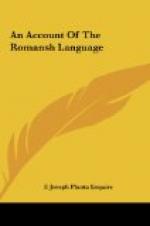But to proceed;—several Roman families, dreading the fury of the Carthaginians under Hannibal, and perhaps, since during the rage of the civil wars, and the subsequent oppressive reigns, interior commotions and foreign invasions, forsook the Latium and Campania, and resorted for a peaceful enjoyment of their liberty, some into the islands where Venice now stands, and many into the mountains of the Grisons, where they chiefly fixed their residence in the Engadine,[O] as appears not only from the testimonies of authors,[P] but also from the names of several places and families which are evidently of Roman derivation.[Q]
The inhabitants these emigrants found in that place of refuge could not but be a mixture of the Tuscans and original Lepontii; and the two languages which met upon this occasion must, at the very first, have had some affinity; as the Tuscan, which derived immediately from the Greek, is known to have had a great share in the formation of the Roman. But as it is generally observed, that the more polished people introduce their native tongue wherever they go to reside in any considerable numbers, the arrival of these successive colonies must gradually have produced a considerable change in the language of the country in which they settled;[R] and this change gave rise to the dialect since called Ladin, probably from the name of the mother country of its principal authors.[S]
Although the name of Romansh, which the whole language bears, seems to be a badge of Roman servitude, yet the conquest of that nation, if ever effected, could not have produced a great alteration in a language which must already have been so similar to their own; and its general name may as well be attributed to the pacific as to the hostile Romans. But when we consider that a coalition of the two main dialects, which differ so far as not to be reciprocally understood, must have been the inevitable consequence of a total reduction; and that such a coalition is known never to have taken place, we may lay the greater stress upon the many passages of ancient authors,[T] in which it is implied that the boasted victories of the Romans over the Rhaeti, for which public honours had been decreed to L. Munatus, M. Anthony, Drusus, and Augustus, amounted to no more than frequent repulses of those hardy people into their mountains; out of which their want of sufficient room and sustenance, (which in our days drives considerable numbers into the services of foreign powers) compelled them at times to make desperate excursions in quest of necessaries. And we may also from these collected authorities be induced to give the greater credit to the commentator of Lucan,[U] and to the modern historians,[V] who positively assert, that the people living near the sources of the Rhine and the Inn were never totally subdued by the Roman arms; but only repelled in their attempts to harass their neighbours.




